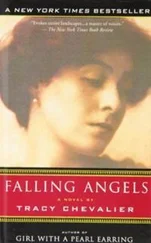‘No. But -’
‘I tell you when we drive.’
Jean-Paul pulled up to the gas station in a battered white Citroën Deux Chevaux, one of those cars that looks like a flimsy Volkswagen Beetle and has a soft roof that can be rolled back like a sardine can. Its engine makes an unmistakable sound, a friendly churning whine that always made me smile when I heard it. I thought Jean-Paul would have a sports car, but a Deux Chevaux made sense.
He looked so furtive getting out of his car and into mine that I laughed. ‘So, you think people will talk about us?’ I remarked as I pulled onto the Albi road.
‘It is a small town. Many old women there have nothing to do but watch and discuss what they see.’
‘Surely they don't mean anything by it.’
‘Ella, I will describe to you the day of one of these women. She gets up in the morning and has her breakfast out on her terrace, so she watches everyone who goes by. Then she does her shopping; she goes to all the shops every day and talks to the other women and watches what other people do. She comes back and stands in front of her door and talks to her neighbours and watches. She sleeps for an hour in the afternoon when she knows everyone else will be asleep and she will not miss anything. She sits on her terrace for the rest of the afternoon, reading the newspaper but really watching all that passes in the street. In the evening she goes for another walk and talks to all her friends. There is a lot of talking and watching in her day. That is what she does.’
‘But I haven't done anything in public for them to talk about.’
‘They will take anything and twist it.’
I took a curve wide. ‘There's nothing I've done in that town that anyone could possibly find interesting or scandalous or whatever it is you're implying.’
Jean-Paul was quiet for a moment. Then he said, ‘You are enjoying your onion quiches, yes?’
I stiffened for a second, then laughed. ‘Yeah, quite an addiction, really. I bet the old gossips are really shocked.’
‘They thought that you were, that you were -’ He stopped. I glanced at him; he looked embarrassed. ‘Pregnant,’ he finished finally.
‘What?’
‘That you were having a craving.’
I began to titter. ‘But that's ludicrous! Why would they think that? And why would they care?’
‘In a small place everyone knows everyone else's business. They believe it is their right to know if you are having a baby. But anyway they know now that you're not pregnant.’
‘Good,’ I muttered. Then I glared at him. ‘How do they know I'm not pregnant?’
To my surprise Jean-Paul looked even more embarrassed. ‘Nothing, nothing, they just -’ He trailed off and fumbled with his shirt pocket.
‘What?’ I began to feel sick with disgust at what they might know. Jean-Paul pulled a pack of cigarettes from his pocket. ‘Do you know the machine for selling Durex just off the square?’ he asked at last.
‘Ah.’ Someone must have seen Rick buying them that night. God, I thought, what haven't they sniffed out? Does the doctor broadcast every visit? Do they go through our garbage?
‘What else have they said?’
‘You do not need to know.’
‘What else have they said?’
Jean-Paul gazed out the window. ‘They notice everything you buy in the shops. The postman tells them about every letter you receive. They know when you go out during the day, and they notice how much you go out with your husband. And, well, if you do not use your shutters they look inside, too.’ He sounded more disapproving of me not closing my shutters than of their looking in.
I shivered, thinking of the choking baby, of all those shoulders turned against me.
‘What have they said specifically?’
‘You want to know?’
‘Yes.’
‘There was the quiches and the craving. Then they think you are pretentious because you bought a washing machine.’
‘But why?’
‘They think that you should wash by hand the way they do. That only people with children should have machines. And they think the colour you painted your shutters is vulgar and not right for Lisle. They think you lack finesse. That you should not wear dresses without sleeves. That you are rude to speak English to people. That you are a liar because you told Madame Rodin at the boulangerie that you lived here when you didn't yet. And you picked the lavender in the square, and no one does that. In fact that was their first impression of you. It is hard to change that.’
We drove in silence for a few minutes. I felt tearful but wanted to laugh too. I had only spoken English once in public, but that counted for much more than all the times I spoke French. Jean-Paul lit a cigarette and opened his window a crack.
‘Do you think I'm rude and lack finesse?’
‘No.’ He smiled. ‘And I think you should wear dresses without sleeves more often.’
I blushed. ‘So did they have anything nice to say about me?’
He thought for a moment. ‘They think your husband is very handsome, even with the -’ He gestured at the back of his head.
‘Ponytail.’
‘Yes. But they do not understand why he runs and they think his shorts are too short.’
I smiled to myself. Jogging did seem out of place in a French village, but Rick was impervious to people's stares. Then my smile faded.
‘Why do you know all this about me?’ I asked. ‘About quiches and being pregnant and shutters and washing machines? You act like you're above all this gossip, but you seem to know as much as everybody else.’
‘I am not a gossip,’ Jean-Paul replied firmly, blowing smoke at the top of the window. ‘Someone repeated it to me as a warning.’
‘A warning of what?’
‘Ella, it is a public event every time you and I meet. It is not right for you to meet me. I was told that they are gossiping about us. I should have been more careful. It does not matter about me, but you are a woman, and it is always worse for a woman. Now you will say that it is wrong,’ he continued as I tried to interrupt, ‘but whether right or wrong, it's true. And you are married. And you are a stranger. All these things make it worse.’
‘But it's insulting that you feel their judgment comes before mine. What's wrong with seeing you? I'm not doing anything wrong, for God's sake. I'm married to Rick, but that doesn't mean I can't ever talk to another man!’
Jean-Paul didn't say anything.
‘How do you live with this?’ I said impatiently. ‘With this gossipy village life? Do they know everything about you?’
‘No. Of course it was a shock after big cities, but I learned to be discreet.’
‘And you call this discreet, sneaking off to meet me like this? Now we really do look guilty.’
‘It's not exactly like that. What offends them most is when it's in front of them, under their nostrils.’
‘Noses.’ I smiled in spite of everything.
‘Noses, under their noses.’ He smiled back grimly. ‘It is a different psychology.’
‘Well anyway, the warning hasn't worked. Here we are, after all.’
We were silent for the rest of the journey.
The cover was burned half off, the pages charred and unreadable, except for the first. Written in a spidery hand, in faded brown ink, was the following:
Jean Tournier n. 16 août 1507
m. Hannah Tournier 18 juin 1535
Jacques n. 28 août 1536
Etienne n. 29 mai 1538
m. Isabelle du Moulin 28 mai 1563
Jean n. 1 janvier 1563
Jacob n. 2 juillet 1565
Marie n. 9 octobre 1567
Susanne n. 12 mars 1540
m. Bertrand Bouleaux 29 novembre 1565
Deborah n. 16 octobre 1567
Four pairs of eyes rested on me: those of Jean-Paul, Mathilde, Monsieur Jourdain – who to my surprise was sitting next to Mathilde drinking a highball when we walked in – and a small blonde girl perched on a stool with a Coke in her hand, eyes wide with excitement, introduced as Mathilde's daughter, Sylvie.
Читать дальше
Конец ознакомительного отрывка
Купить книгу







![Трейси Шевалье - Тонкая нить [Литрес]](/books/386177/trejsi-shevale-tonkaya-nit-litres-thumb.webp)




